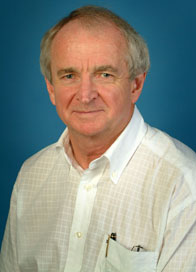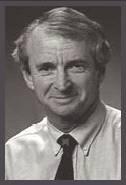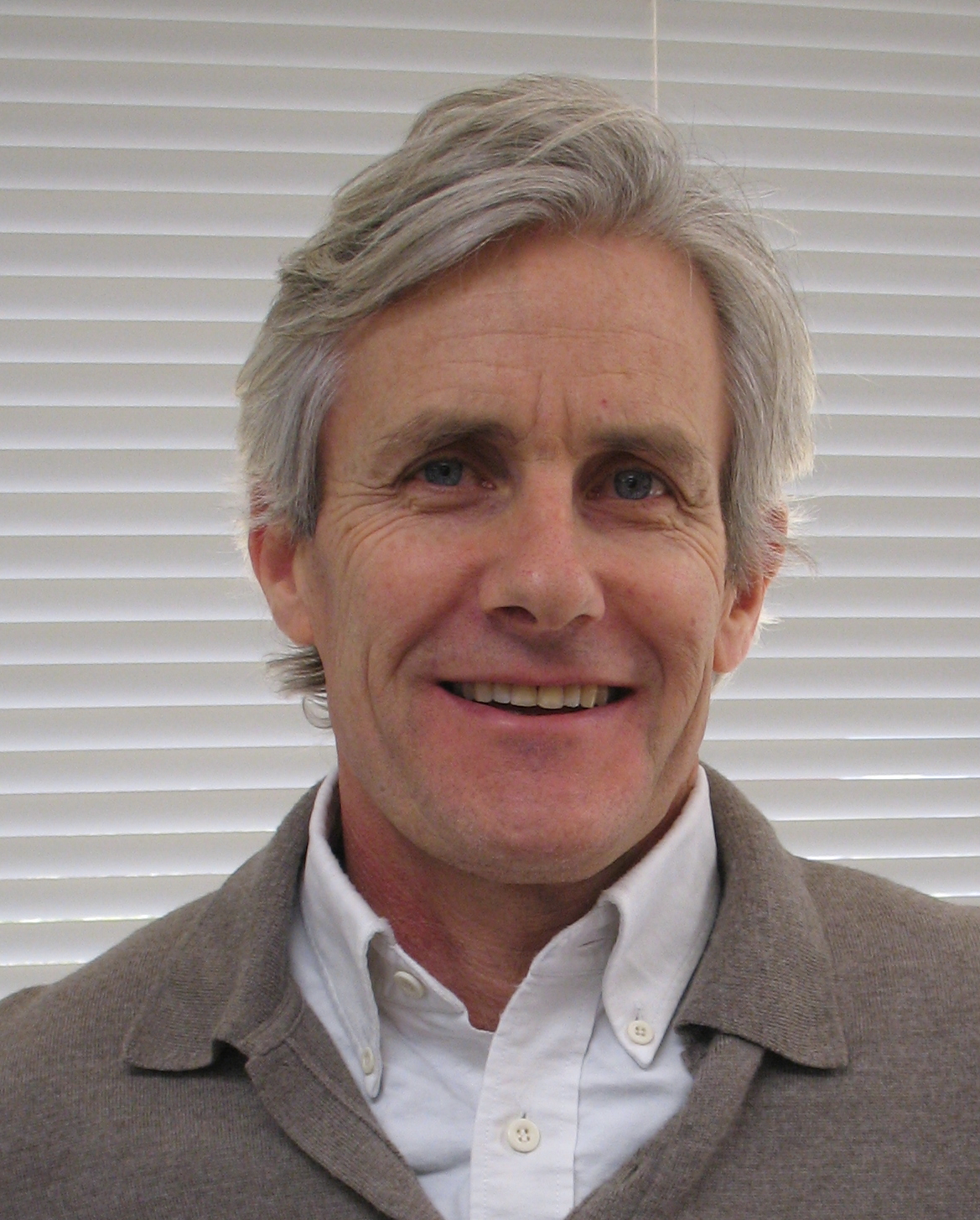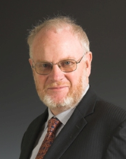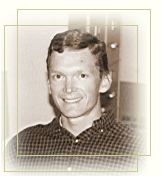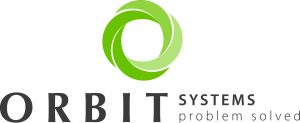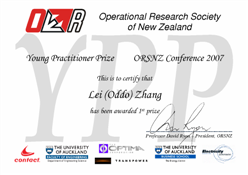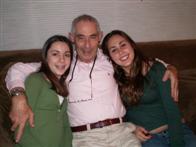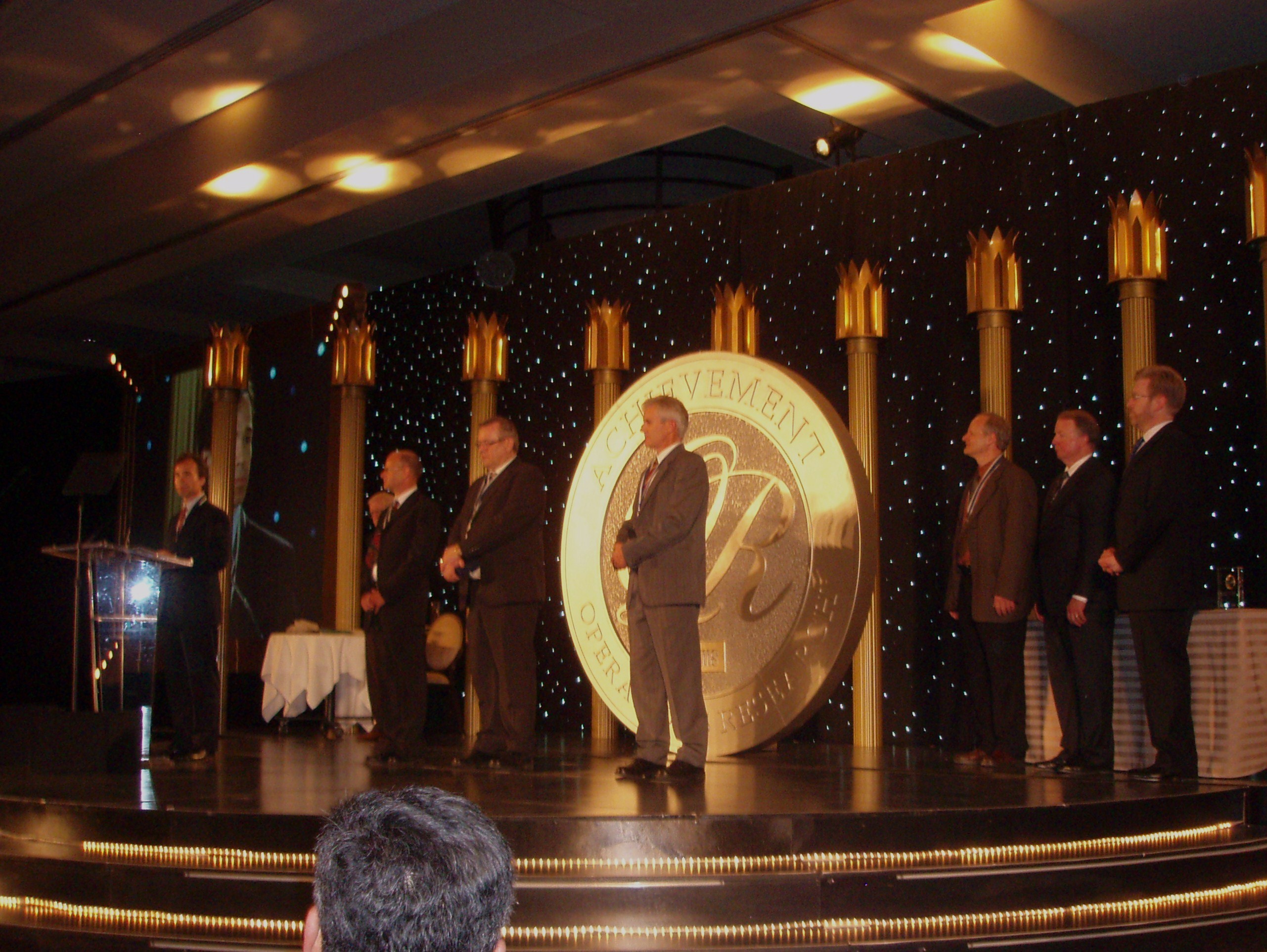[President’s Lifetime Achievement Award] [Hans Daellenbach Prize] [Visiting Lecturers] [Young Practioner Prize] [John A. George Memorial Prize] [Older ORSNZ Prizes] [Other Prizes awarded to Members]
President’s Lifetime Achievement Award
In 2013 the first President’s Lifetime Achievement Award was presented to Prof David Ryan. The President’s Lifetime Achievement Award is in recognition of contributions made throughout the recipient’s career to both the ORSNZ and Operations Research in New Zealand and internationally.
| Year | Prize Winner | ||
| 2013 Inaugural Prize |
|
ORSNZ Hans Daellenbach Prize
| To honour the considerable contributions of Emeritus Professor Hans Daellenbach to Operations Research/Management Science (OR/MS) in New Zealand, the ORSNZ established the ORSNZ Hans Daellenbach Prize in 2001. Professor Daellenbach’s contributions reflect his belief that the best work in OR/MS combines strong innovative methodology with practical impact. The Daellenbach Prize will be awarded for such a body of work that has made a significant contribution and received international recognition. More details… You can read more about Hans in the March 1999 Newsletter, and peruse one of his articles in the Jan 1996 Newsletter. |
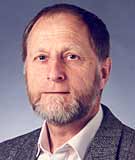 Emeritus Professor Hans Daellenbach Emeritus Professor Hans Daellenbach |
| Year | Prize Winner | ||
| 2001 Inaugural Prize |
|
||
| 2003 |
|
||
| 2006 |
|
||
| 2012 |
|
||
| 2017 |
|
||
| 2023 |
|
ORSNZ Visiting Lecturers
Call for Nominations: The ORSNZ invites nominations for ORSNZ honorary visiting lecturers to visit New Zealand between September and June each year. Each visiting lecturer is invited to give a talk on some topic likely to be of general interest to ORSNZ members at three or more of Auckland, Hamilton, Wellington, and Christchurch. Each visiting lecturer will be invited to write a guest editorial for the society newsletter. The ORSNZ contributes to the costs up to a maximum of $1000 plus GST (if any) per visitor. Each candidate must be nominated by a current member of ORSNZ, “the champion”. The nomination must include the CV of the nominated visiting lecturer, the date and location of the hosts of the visit, the name of the champion and an undertaking by the champion to coordinate a visit by the nominee to three or more of the above named centres. Enquiries concerning, or nominations for, lectureships should be sent to president@orsnz… The closing date for nominations is the end of April.
Once nominations have been received, the President will consult Council before forming a subcommittee to review the nominations. The subcommittee is to determine the options that are to be presented to Council. Multiple visiting lecturers in any one year are permissible if the circumstances permit.
| Year | Vistor | ||
| 2007 |
|
||
| 2008 |
|
||
| 2008 |
|
ORSNZ Young Practitioner Prize
Effective from 2013.11.26
- The Young Practitioner Prize (YPP) is open to all presenters at the annual ORSNZ conference who are within 5 years of graduation on the first day of presentations at the conference. YPP entrants must clearly identify themselves to the conference organisers by any deadline specified in the call for papers or on the conference website, when submitting their abstract and their paper, and when registering.
- YPP entrants will present their work in a talk of typically 15 to 20 minutes duration, with approximately 5 minutes for questions. (The exact figures are determined by the conference organizer to fit the conference schedule.) The presentation length will be strictly enforced.
- YPP entrants must submit a paper to the conference organisers that meets the requirements for inclusion in the conference proceedings. Except in exceptional circumstances, this paper will be published in the proceedings.
- Supervisors of YPP entrants are normally expected to appear as an author if they have contributed to the ideas or implementation described in the paper. Supervisors may not take part in the presentation of the work.
- In addition to the submitted paper, YPP entrants must submit a cover sheet (see YPPcoversheet.doc or YPPcoversheet.pdf) detailing:
- the starting point of the project (including existing software),
- the entrants’ contributions to the work (clearly distinguishing this from the supervisor’s contributions) and
- whether they are an industrial practitioner, or a PhD, Masters, or undergraduate student, and the time that they allocated to the project (e.g. 1/8th of an academic year, or 2 years of a PhD program, or 5 years working in industry).
This completed signed form should be brought to the conference and submitted during registration. This cover sheet is to be signed by the YPP entrant’s academic or commercial supervisor(s) (or the entrant themselves if no such supervisor exists).
- The ORSNZ will award up to four YPP prizes at each conference from a total prize pool of up to $1000 for the judges to distribute between winners as they see fit. Not all prizes will be awarded if there are insufficient entrants of a satisfactory standard.
- The judges will take into consideration the quality of both the entry’s written paper and their oral presentation. Guidelines that will be used to assess entries include originality, initiative taken, difficulty of topic, the amount of time allocated to the project, and a broader recognition of the context of the project such as the assumptions made, limitations, alternative views, innovation, potential application, and future work.
Notes:
- Typically three prizes of values $500, $300 and $200 have been awarded.
- Multiple prizes have been awarded to the same person over several years.
- In 2006, the judging committee explicitly distinguished entries by PhD students and industrial practitioners from entries by Masters/Honours and undergraduate students.
- In past conferences, we have had talk lengths of: 2007:15+5; 2006:18 in total; 2005: 15+5; 2004: 20+2.5
Additional details for the format of the paper for 2018’s conference can be found here.
Young Practitioner Prize Winners
Drumroll…
| Year | Prize | Author | Association | Paper |
|---|---|---|---|---|
|
2023 YPP
|
Best paper | Dominic Keehan | University of Auckland, PhD (Engineering Science and Bioengineering) | Dominic Keehan, Andy Philpott, Andrew Mason Multistage production planning and price modelling |
| Best presentation | Mostafa Papen | University of Auckland, PhD (Engineering Science and Bioengineering) | Mostafa Papen, Michael O’Sullivan, Yang Zou, Daniel Kulasingham Towards the development of a Virtual Safety Officer – Few-Shot-Learning prototype |
|
|
2022 YPP
|
Christina Yin-Chieh Lin | University of Auckland, PhD (Engineering Science and Bioengineering) | Modelling housing feature impacts on sale price in newly developed suburbs relative to a standard house | |
| Karl Zhu | University of Auckland, PhD (Engineering Science and Bioengineering) | Finding the missing with integer programming | ||
| Uwe Langenmayr | Karlsruhe Institute of Technology, PhD (Institute for Industrial Production) | Calculation of synthetic energy carrier production costs with high temporal and geographical resolution. | ||
|
2019 YPP
Sponsored by
|
Best paper | Thomas Adams | University of Auckland, PhD (Engineering Science) | Thomas Adams, Michael O’Sullivan, Cameron WalkerComparison of objective functions for scheduling surgeries |
| Best presentation | Param Iyer | University of Auckland, PhD (Business School) | Parameshwaran Iyer, Ronald Veldman, Yao Zhang Universal locker systems for urban metros | |
| Highly commended | Snigdha Saha | University of Auckland, Undergraduate (Engineering Science) | Snigdha Saha, Olivier Graffeuille The optimisation of milk collection | |
|
2018 YPP
Sponsored by Thanks to our judges:
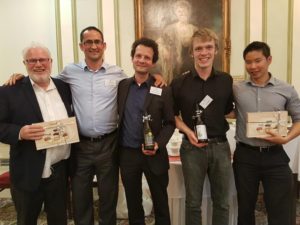 |
First-place $500 | Isaac D Cleland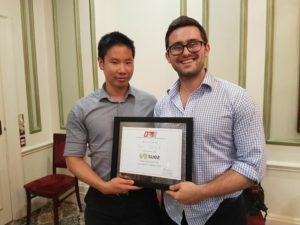 |
University of Auckland, PhD (Engineering Science) | Isaac D. Cleland, Andrew Mason, and Michael O’Sullivan Improved Staff Rostering Algorithms |
| Second-place $300 | Haddon Smith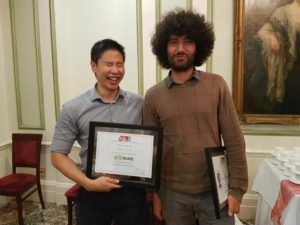 |
University of Auckland, BE(Hons) (Engineering Science) | Haddon Smith, Thomas Graham-Murdoch, Richard Clarke, Naresh Singhal, Alys Clarke, Vinod Suresh, Andrew Mason, and Stephen Waite. Determining effective placement strategies for denitrifying bioreactors in New Zealand river systems | |
| 3rd-place $200 | Jesse Prendergast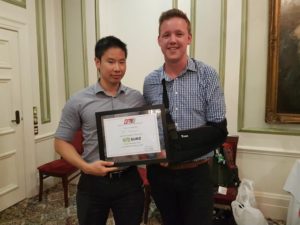 |
University of Auckland, ME (Engineering Science) | Jesse Prendergast, Andrea Raith, and Andrew Mason Simulating First and Last Mile Transport in Auckland | |
| First-place $500 | Oscar Dowson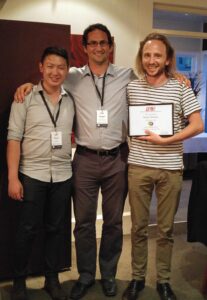 |
University of Auckland, PhD (Engineering Science) | Oscar Dowson. SDDP.jl: a Julia package for Stochastic Dual Dynamic Programming | |
| Second-place $300 | Thomas Adams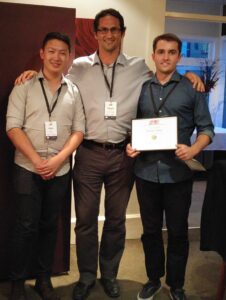 |
University of Auckland, PhD (Engineering Science) | Thomas Adams. Balancing Physician Workloads Under Uncertain Admissions | |
| Third-place $200 | Isaac Cleland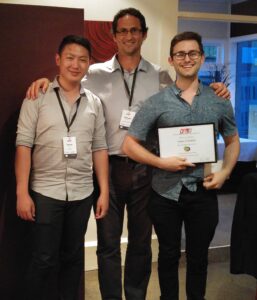 |
University of Auckland, PhD (Engineering Science) | Isaac Cleland. Solving a Generalised Staff Rostering Problem | |
| First-place $450 | University of Auckland, Undergraduate (Engineering Science) | Ryan Cory-Wright, Andy Philpott and Golbon Zakeri. Cost-recovering, revenue-adequate single settlement schemes for electricity markets | ||
| Highly Commended $275 | Victoria University of Wellington, PhD (School of Economics and Finance) | Melissa Welsh. Modelling traceability in the dairy industry | ||
| Highly Commended $275 | University of Auckland, Undergraduate (Engineering Science) | Danielle Gatland and Andrea Raith. Mapping electric vehicle range | ||
|
2015 YPP
|
Best doctoral paper $250 | Faisal Wahid (3rd from left) | University of Auckland, PhD (Engineering Science) | Faisal Wahid, Andy Philpott and Frédéric Bonnans. MIDAS touch: Solving hydro-bidding problems using mixed integer programs |
| Best presentation $250 | Michael Lindahl (2nd from left) | Technical University of Denmark (DTU), PhD (Management Engineering) | Michael Lindahl and Niels-Christian Fink Bagger. Optimizing the Cable Collection Grid in Offshore Wind Farms | |
| Best undergraduate presentation $250 | Joshua Dawes (centre) | University of Auckland, BE(Hons) (Engineering Science) | Joshua Dawes, Golbon Zakeri and Geoffrey Pritchard. Efficient electric vehicle charging | |
| Most promising conceptual development $125 | Regan Baucke (2nd from right) | University of Auckland, PhD (Engineering Science) | Regan Baucke, Golbon Zakeri and Tony Downward. Exploring state dependent risk aversion in multistage programming problems | |
| Innovative technical development prize $125 | Keith Ruddell (3rd from right) | University of Auckland, PhD (Engineering Science) | Keith Ruddell, Andy Philpott and Anthony Downward. Transmission-constraned supply-function equilibria with price-taking players | |
|
|
1st Postgraduate $250 | Lin Chen | University of Auckland PhD ( Civil & Environmental Engineering) | Lin Chen, Andrea Raith and Theunis F. Henning. Multi-objective optimisation in decision making of road maintenance Judges’ comment “Great overview and testing of alternative methods, with some serious application in mind.” |
| 1st Equal Undergraduate $250 | James Waugh | University of Auckland, BE(Hons) (Engineering Science) | James Waugh and Andrew Mason. Columnwise Search – A heuristic for the Vehicle Routing Problem applied to Waste Collection Judges’ comment “Another nice balanced applied OR project, using optimisation to deliver significant efficiency gains on a real problem, in a comprehensible manner.” |
|
| 1st Equal Undergraduate $250 | Ben Goodger | University of Auckland, BE(Hons) (Engineering Science) | Ben Goodger, Cameron Walker and Anthony Downward. Developing online heuristics and a near optimal benchmark for apple packing Judges’ comment “A nice balanced applied OR project, using optimisation to set upper bound on possible gains, then developing implementable heuristics to deliver measurable gains on a potentially large scale.” |
|
| Special Prize for initiative and “good old fashioned” effectiveness $250 | Michael Fairley and Oscar Dowson | University of Auckland, BE(Hons) (Engineering Science) | Michael Fairley and Oscar Dowson. Partitioning students into equitable groups using SolverStudio Judges’ comment “Quick, and not actually all that dirty.” |
|
|
|
1st Postgraduate $400 | Antony Phillips | Auckland PhD (EngSci) | Antony Phillips, Matthias Ehrgott and David Ryan. Solving the Classroom Assignment Problem Using Integer Programming |
| 1st Equal $300 Undergraduate |
Jack Dunn | Auckland, BE (EngSci) | Jack Dunn, Golbon Zakeri and Anthony Downward: Binary Interruptible Load Optimisation |
|
| 1st Equal $300 Undergraduate |
Max Biggs | Auckland, BE (EngSci) | Max Biggs and Tony Downward. 2D Shape Optimization Applied to Diamond Cutting |
|
|
|
1st PhD $400 | Olga Perederieieva | Auckland PhD (EngSci) | Olga Perederieieva. Solving Bi-objective Traffic Assignment Based on Time Surplus Maximisation |
| 1st Masters $300 | Simon Bull | Auckland, BE (EngSci), ME (EngSci) |
Simon Bull, Andrew Mason and Andrea Raith: Scheduling Families of Jobs on Multiple Identical Machines to Minimize Total Tardiness |
|
| 1st Equal $150 Undergraduate |
Rosemary Read | Canterbury, BA(Hist), BCom Hons (MSci) |
Rosemary Read, Shane Dye, Grant Read: Generalized CDDP for Reservoir Management |
|
| 1st Equal $150 Undergraduate |
Jingze (Emily) Du | Auckland, BE (EngSci) | Jingze Du, Matthias Ehrgott and Andrea Raith. Optimal Delivery of Arc Modulated Radiation Therapy in Cancer Treatment |
|
| 1st Postgraduate | Anthony Downward | Auckland, BE (EngSci) PhD (EngSci) |
Risk Aversion and Retail Electricity Markets | |
| Honourable Mention Postgraduate |
Oddo Zhang | Auckland, BE (EngSci), PhD (EngSci) |
Optimisation of Small-Scale Ambulance Move-Up | |
| 1st Equal Undergraduate |
Jason Drake | Auckland, BE (EngSci) | Design of Road Networks | |
| 1st Equal Undergraduate |
Jason Undan | Auckland, BE (EngSci) | Optimisation of Demand-Side Bidding | |
| Honourable Mention Undergraduate |
Thomas Liddle | Victoria, BSc (Hons) | Kick Strength and Online Sampling for Iterated Local Search | |
| Honourable Mention Undergraduate |
Uttara Nataraj | Auckland, BE (EngSci) | Selecting a Portfolio of Cycling Projects | |
|
2009 YPP
Judges Comments |
1st Postgraduate | Faram Engineer | Auckland, BE ME (EngSci) PhD (Georgia Tech) |
Catch-up Scheduling for Childhood Vaccination [pdf] |
| 1st Undergraduate | Qi-Shan Lim | Auckland, BE (EngSci) | Trim Loss and Inventory Optimisation in Paper Mills | |
| 2nd Undergraduate | Antony Phillips | Auckland, BE (EngSci) | Optimisation Models and Methods for the Container Positioning Problem in Port Terminals |
|
|
|
1st | Brendan Kite (& Kevin Lao) |
Canterbury | Evaluation of Clean Development Mechanism and Joint Implementation Projects [pdf] |
| 2nd | Anders Dohn (& Esben Kolind) |
DTU (Technical University of Denmark), Denmark |
Optimizing Manpower Allocation for Ground Handling Tasks in Airports using Column Generation [pdf] |
|
| 3rd= | Antony DePont | Auckland, BE (EngSci) | Order Picking in Warehouses [pdf] | |
| 3rd= | Gemma Clark | Victoria | Elder Care in NZ: A Multi-framing Approach [pdf] | |
| 3rd= | Andrea Raith | Auckland, PhD (EngSci) | Traffic Assignment with Travel Time and Toll Cost Objectives [pdf] | |
| 1st | Lei (Oddo) Zhang | Auckland, BE (EngSci) | Optimization of well placement and flow [certificate] | |
| 2nd | Martin Peat | Auckland, BE (EngSci) | Loading congestion at New Zealand aluminium smelters | |
| 3rd | Bassy Tam | Auckland, PhD (EngSci) | Unit crewing in the airline tour of duty planning problem | |
| 2006 | 1st PhD | Richard Lusby | Auckland, PhD (EngSci) | Routing Trains Through Railway Junctions: A New Set Packing Approach [pdf] |
| 1st ME/Hons | Stuart Donovan | Anckland, ME (EngSci) | An improved mixed integer programming model for wind farm layout optimization [pdf] | |
| 2nd ME/Hons | David Richards | Anckland, ME (EngSci) | A Study of Optimised Ambulance Redeployment Strategies [pdf] | |
| 2005 | 1st | Oliver Tompkins | Auckland, BE (EngSci) | Strategic Production Plan Model for the Hunua Quarry [pdf] |
| 2nd | David Craigie | Auckland, BE (EngSci) | Portfolio Optimization via Stochastic Dominance of Benchmarks [pdf] | |
| 3rd= | Tim Steer & Richard Bramley |
Canterbury, BSc (Hons) | Capacity modelling of the South Island chicken operation at Tegel Foods Ltd [pdf] |
|
| 3rd= | Stuart Donovan | Auckland, BE (EngSci) | Wind Farm Optimization [pdf] | |
| 2004 | 1st | Kavinesh Singh | Auckland, PhD (EngSci) | Column Generation for Capacity-Expansion Planning of Electricity Distribution Network |
| 2nd | Sanjay Patel | Auckland, BE (EngSci) | Locomotive Allocation for Toll NZ | |
| 3rd | Sarah Kirkpatrick | Auckland, BE (EngSci) | Better Base Locations for the Melbourne Ambulance Service | |
| 2003 | 1st= | Jarrad Wallace Martin Young |
Auckland, ME (EngSci) Auckland, ME (EngSci) |
Optimal Yacht Rig Design using Mathematical Programming Roster Construction for Tranz Rail |
| 2002 | 1st | Ambili Viswambharan | Auckland, BE (EngSci) | Optimisation in Diamond Cutting |
| 2nd | James Tipping | Canterbury, BScHons | Scheduling and Routing Grass Mowers Around Christchurch | |
| 3rd | Lenrick Johnston | Auckland, BE/BCom, ME | Optimisation of Irradiation Directions in IMRT Treatment | |
| 2001 | 1st | Hamish Dean | Canterbury, PhD | Compaction Algorithms for the Garment Manufacturing Industry |
| 2nd | Stephanie Pegg | Beca Carter (ex Auckland, BE EngSci) |
An Online Optimised Pump Scheduling System | |
| 3rd | Michael Clist | Auckland, BE/BCom | Plant Location Modelling for the Concrete and Asphalt Industries | |
| 2000 | 1st | Thorsten Piehl | Auckland, ME EngSci | Cell Batching Optimisation for the New Zealand Aluminium Smelter |
| 2nd | Mark Stewart | Canterbury, PhD | Operational Decision Making for Internet Service Provision | |
| 3rd | Rochelle Meehan | Auckland, BE EngSci | Flight Schedule Optimisation for Air New Zealand’s International Fleet |
The table below details older winners of the Young Practitioner Prize. Drumroll…
| Year | First Prize | Second Prize | Third Prize |
| 2007 (Auckland) | Lei (Oddo) Zhang BE, Auckland | Martin Peat | Bassy Tam PhD, Auckland |
| 2006 (Christchurch): PhD Section | Richard Lusby PhD Auckland | ||
| 2006 (Christchurch): Masters/Honours | Stuart Donovan ME Auckland | David Richards ME Auckland | |
| 2005 (Wellington) | Oliver Tompkins, BE, Auckland | David Craigie,BE, Auckland | Tim Steer & Richard Bramley, Canterbury Stuart Donovan,BE, Auckland |
| 2004 (Auckland) | Kavinesh Singh, PhD, Auckland | Sanjay Patel, BE, Auckland | Sarah Kirkpatrick,BE, Auckland |
| 2003 (Waikato) | Jarrad Wallace ME, Auckland Martin Young ME, Auckland |
Not awarded | Not awarded |
| 2002 (Auckland) | Ambili Viswambharan BE, Auckland | James Tipping BScHons, Canterbury | Lenrick Johnston ME, Auckland |
| 2001 (Canterbury) | Hamish Dean PhD, Canterbury | Stephanie Pegg Beca Carter | Michael Clist BE/BCom, Auckland |
| 2000 (Wellington) | Thorsten Piehl ME, Auckland | M Stewart PhD, Canterbury | Rochelle Meehan BE, Auckland |
| 1999 (Waikato) | Catherine Hicks BE, Auckland | Bert Chen BE, Auckland | Parvati Patel BE, Auckland |
| 1998 (Auckland) | Stuart Mitchell Auckland | Andrew Coyle Auckland | – |
| 1997 (Melbourne) | No Paper Prize; ORSNZ conference run as part of APORS, Melbourne | ||
| 1996 (Canterbury) | Kevin Broad Auckland & Gavin Bell Canterbury |
Not awarded | Carey Stevens Auckland |
| 1995 (Victoria) | Kevin Broad Auckland | James Deaker Auckland | Kelvin WatsonMassey? |
| 1994 (Massey) | Megan Thornley Auckland | Twan Vollebregt Canterbury | – |
| 1993 (Auckland) | Curt Hjorring Auckland | Geoffrey Gill Auckland & Mark Craddock Auckland |
– |
| 1992 | Colin Ives Auckland & Paul Day Auckland |
– | – |
| 1991 | Brendan Ring Canterbury | ? | – |
Notes: Papers authored by two or more Young Practitioners were first formally permitted in 2005; previous entries had (generally) been single authored. In 2005, the maximum permitted age was increased from 25 to 30 effective for 2006 onwards.
John A. George (JAG) Memorial Prize

This prize is awarded annually for the best application of OR for improving lives.
“How does the project contribute to improving the quality of people’s lives, particularly those who may otherwise be vulnerable or disadvantaged, now, or in the future?”
| Year | Winners |
| 2023 | Winner: Shirekha Layangan |
2019 Sponsored by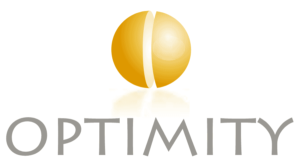 |
Winner: Hrishi KodthuguliHighly Commended: Maaike Vollebergh |
| 2018 | Haddon Smith, Thomas Graham-Murdoch, Richard Clarke, Naresh Singhal, Alys Clarke, Vinod Suresh, Andrew Mason, and Stephen Waite (1st place) Determining effective placement strategies for denitrifying bioreactors in New Zealand river systems 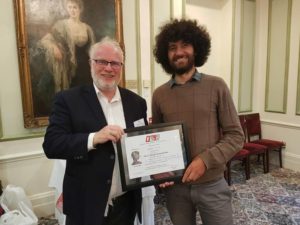 Jesse Prendergast, Andrea Raith, and Andrew Mason (2nd place) Simulating First and Last Mile Transport in Auckland 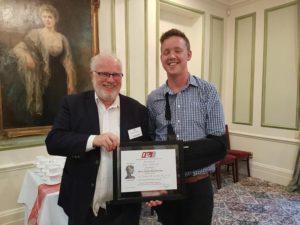 “The John George Memorial prize was established to encourage researchers to think about the implications of their work in terms of improving the lives of people, particularly those who might otherwise be disadvantaged or excluded. It was always intended that the award could apply to cases where benefits were delivered directly to individuals, or indirectly by improving the environment within which communities must live.The paper delivered by Haddon Smith (with due acknowledgement to student co-author Thomas Graham-Murdoch and various supervisors) on Determining effective placement strategies for denitrifying bioreactors in New Zealand river systems, aligned perfectly with those objectives. We loved the way this project brought researchers from different disciplines together to address a major public issue of the day. And we were impressed by the way the authors applied several alternative OR techniques to real-life large scale catchments, and the broadly applicable insights they were able to infer from their detailed analysis.We also very much liked Jesse Prendergast’s paper on Simulating Transport-as-a-Service for First- and Last-Mile Transport in Auckland. This kind of service will be of increasing relevance, in terms of reducing energy consumption, greenhouse gas emissions and congestion, but also as a means of making realistically priced transport options more accessible to those unable to drive cars.We would like to commend all three contestants, and their supervisors, who all made positive contributions in their own way, and to specially thank Orbit Systems for sponsoring this year’s awards.”Grant Read, Vicky Mabin and Bob Cavana, JA George Judges, 2018 |
| 2017 | Samuel Ridler – Ambulance simulation and optimisation (1st equal) Samin Aref – Computing the frustration index in signed graphs using binary programming (1st equal) |
